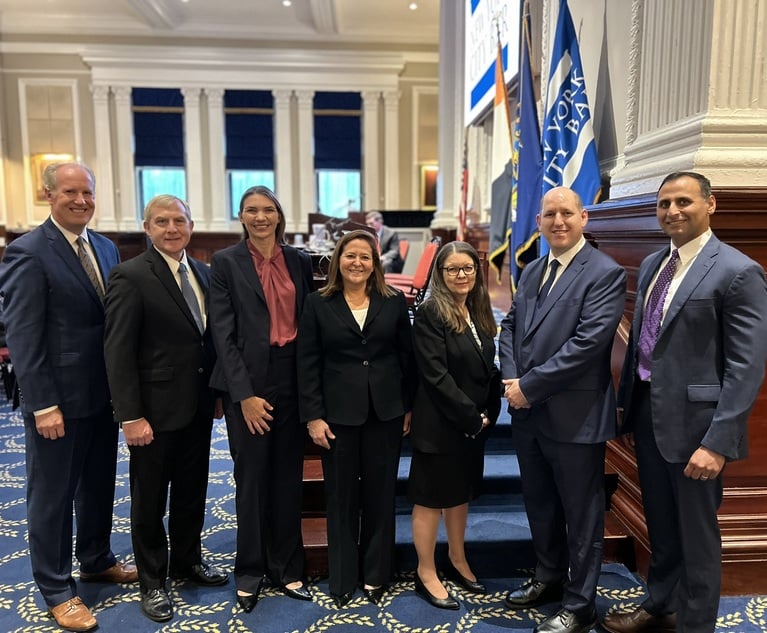 Hank Greenberg of GreenbergTraurig. Photo: Ryland West/ALM
Hank Greenberg of GreenbergTraurig. Photo: Ryland West/ALM Attorney of the Year Finalist: Hank Greenberg of Greenberg Traurig
Henry "Hank" Greenberg, a shareholder in Greenberg Traurig's Albany office with a long list of public-service accolades and a finalist for Law…
September 05, 2024 at 09:00 AM
7 minute read
Henry "Hank" Greenberg, a shareholder in Greenberg Traurig's Albany office with a long list of public-service accolades and a finalist for Law Journal's Attorney of the Year award, flew to Tel Aviv within weeks of Hamas' deadly invasion of Israel on Oct. 7.

Greenberg spent five days there, and from his firm's Tel Aviv office convened a virtual meeting between leaders of New York's legal community and the Israeli Bar Association, for a discussion on ways the Empire State bar could assist with Israel's legal needs.
Greenberg, who experienced three air raids during his time in Israel, played a pivotal role in establishing a pro bono-technology portal for Israelis. He organized a forum in New York on judicial independence for a delegation of Israeli jurists.
At one point during his visit, Greenberg and others were forced to get off a bus and lie face down as the Iron Dome was bombed.
Similarly, in 2022, shortly after Russia invaded Ukraine, Greenberg traveled to the Polish village of Medyaka, a major border-crossing between Ukraine and Poland. There he observed the Ukrainian relief effort up close.
In an interview with the Law Journal, Greenberg said he would have believed that embarking on such experiences would have seemed farfetched—and that his year-long term as president of the New York State Bar Association beginning in June 2019 would have been a bookend to his career in public service.
"But these opportunities present themselves if you're willing to work on a pro bono basis, and people know they can call on you, and that you will deliver," said Greenberg, a prolific writer and public speaker who considers public service "the highest and noblest calling for a lawyer."
A longtime contributor to the Law Journal, Greenberg said public service "has been extraordinarily satisfying and important and meaningful to me. I would encourage others to do it."
Greenberg said his message to law school students would be: "You can do public service in addition to having a vibrant and satisfying private practice. It's possible to do good and do well at the same time."
The 62-year-old, who's in his third decade as a New York lawyer, is a former federal prosecutor in Albany who served as the principal law clerk from 1988 to 1990 to Court of Appeals Associate Judge Judith Kaye, an eventual chief judge who passed in 2016.
Greenberg is an expert on New York's administrative laws, which derives from his years of service in state government. He is a former general counsel to the state health department, and to the state Attorney General's office under Andrew Cuomo.
"Oftentimes, I've represented state agencies and officials in lawsuits when the Attorney General has a conflict," Greenberg said.
Over the past year, Greenberg successfully represented the New York Racing Association in a lawsuit that challenged a $455 million loan that state lawmakers approved in 2023 to finance the reconstruction of Belmont Park in Elmont, which was last renovated in 1968.
He's also recently represented Southern Glazer's Wine and Spirits in litigation that successfully challenged the New York State Liquor Authority's promulgation of regulations that would have imposed fees on bars and small retailers for certain bulk alcohol purchases.
Meanwhile, Greenberg continues to serve on a variety of state boards and legal organizations in unpaid roles.
He's counsel to the New York State Commission on Judicial Nomination, the bipartisan 12-member body that chooses candidates to forward to the governor for nomination to the New York Court of Appeals.
After being busy screening candidates for five Court of Appeals vacancies from summer of 2021 to April 2023, Greenberg said he's glad to have a period of respite.
"It felt like a full-time job," he said.
When asked about his feelings on the difficulty of his work on the commission, considering increasing scrutiny on gubernatorial nominations for the Court of Appeals—specifically the unsuccessful confirmation of Appellate Division, Second Department Presiding Justice Hector LaSalle as the the high court's chief judge before the State Senate's judiciary committee—Greenberg paused before answering.
"The satisfaction of public service comes from the work and knowledge that you're making a contribution – to the profession, to the public, to the community," he began.
NOT FOR REPRINT
© 2024 ALM Global, LLC, All Rights Reserved. Request academic re-use from www.copyright.com. All other uses, submit a request to [email protected]. For more information visit Asset & Logo Licensing.
You Might Like
View All
For Paul Weiss, Progress Means 'Embracing the Uncomfortable Reality'
5 minute read
Kenneth Feinberg Had Dreams of Being on the Big Screen. His 9/11 Victims Fund Gave Him an Unexpected Star Turn

City Bar Holds 32nd Annual Henry L. Stimson Medal Presentation

The 2024 Winners of the Law Journal's Professional Excellence Awards
Law Firms Mentioned
Trending Stories
- 1Call for Nominations: Elite Trial Lawyers 2025
- 2Senate Judiciary Dems Release Report on Supreme Court Ethics
- 3Senate Confirms Last 2 of Biden's California Judicial Nominees
- 4Morrison & Foerster Doles Out Year-End and Special Bonuses, Raises Base Compensation for Associates
- 5Tom Girardi to Surrender to Federal Authorities on Jan. 7
Who Got The Work
Michael G. Bongiorno, Andrew Scott Dulberg and Elizabeth E. Driscoll from Wilmer Cutler Pickering Hale and Dorr have stepped in to represent Symbotic Inc., an A.I.-enabled technology platform that focuses on increasing supply chain efficiency, and other defendants in a pending shareholder derivative lawsuit. The case, filed Oct. 2 in Massachusetts District Court by the Brown Law Firm on behalf of Stephen Austen, accuses certain officers and directors of misleading investors in regard to Symbotic's potential for margin growth by failing to disclose that the company was not equipped to timely deploy its systems or manage expenses through project delays. The case, assigned to U.S. District Judge Nathaniel M. Gorton, is 1:24-cv-12522, Austen v. Cohen et al.
Who Got The Work
Edmund Polubinski and Marie Killmond of Davis Polk & Wardwell have entered appearances for data platform software development company MongoDB and other defendants in a pending shareholder derivative lawsuit. The action, filed Oct. 7 in New York Southern District Court by the Brown Law Firm, accuses the company's directors and/or officers of falsely expressing confidence in the company’s restructuring of its sales incentive plan and downplaying the severity of decreases in its upfront commitments. The case is 1:24-cv-07594, Roy v. Ittycheria et al.
Who Got The Work
Amy O. Bruchs and Kurt F. Ellison of Michael Best & Friedrich have entered appearances for Epic Systems Corp. in a pending employment discrimination lawsuit. The suit was filed Sept. 7 in Wisconsin Western District Court by Levine Eisberner LLC and Siri & Glimstad on behalf of a project manager who claims that he was wrongfully terminated after applying for a religious exemption to the defendant's COVID-19 vaccine mandate. The case, assigned to U.S. Magistrate Judge Anita Marie Boor, is 3:24-cv-00630, Secker, Nathan v. Epic Systems Corporation.
Who Got The Work
David X. Sullivan, Thomas J. Finn and Gregory A. Hall from McCarter & English have entered appearances for Sunrun Installation Services in a pending civil rights lawsuit. The complaint was filed Sept. 4 in Connecticut District Court by attorney Robert M. Berke on behalf of former employee George Edward Steins, who was arrested and charged with employing an unregistered home improvement salesperson. The complaint alleges that had Sunrun informed the Connecticut Department of Consumer Protection that the plaintiff's employment had ended in 2017 and that he no longer held Sunrun's home improvement contractor license, he would not have been hit with charges, which were dismissed in May 2024. The case, assigned to U.S. District Judge Jeffrey A. Meyer, is 3:24-cv-01423, Steins v. Sunrun, Inc. et al.
Who Got The Work
Greenberg Traurig shareholder Joshua L. Raskin has entered an appearance for boohoo.com UK Ltd. in a pending patent infringement lawsuit. The suit, filed Sept. 3 in Texas Eastern District Court by Rozier Hardt McDonough on behalf of Alto Dynamics, asserts five patents related to an online shopping platform. The case, assigned to U.S. District Judge Rodney Gilstrap, is 2:24-cv-00719, Alto Dynamics, LLC v. boohoo.com UK Limited.
Featured Firms
Law Offices of Gary Martin Hays & Associates, P.C.
(470) 294-1674
Law Offices of Mark E. Salomone
(857) 444-6468
Smith & Hassler
(713) 739-1250






